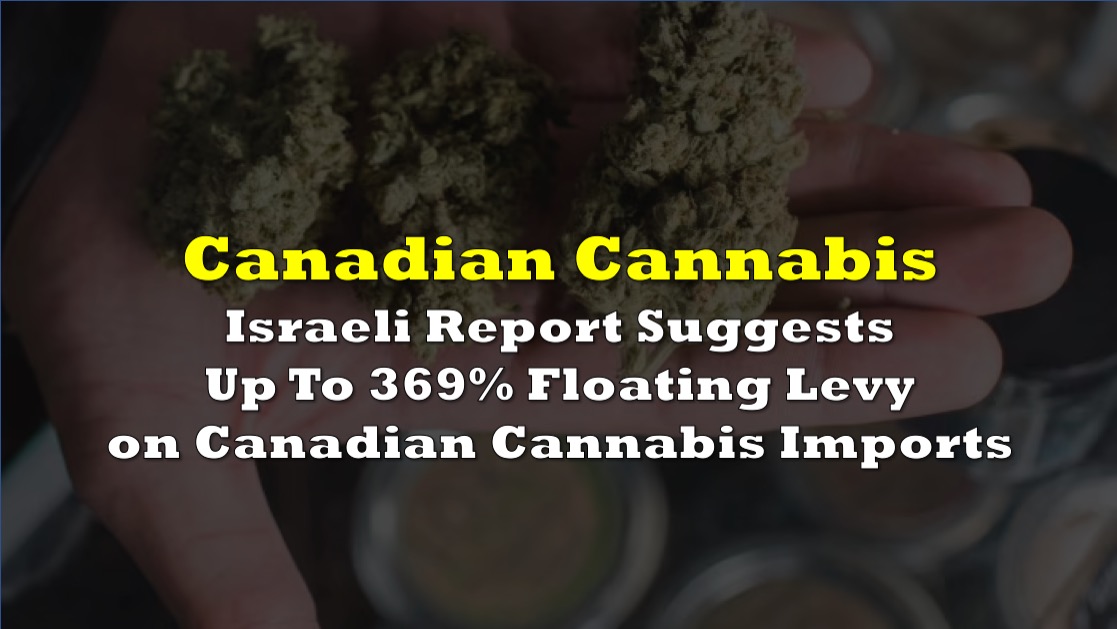The Israeli Government has released a preliminary report regarding accusations that Canadian cannabis companies are dumping low-cost cannabis products in the Israeli medical cannabis market. The investigation, announced in January 2024 by Danny Tal, Commissioner for Trade Levies at the Ministry of Economy and Industry, aims to address concerns over the significant impact of Canadian imports on local cannabis producers.
The investigation revealed that Canadian cannabis was being sold in Israel at prices lower than production costs, a practice seen as unfair trade under the World Trade Organization (WTO) rules.
“Such imports are defined in the World Trade Organization as ‘unfair trade,’ and according to the WTO’s Export Convention, the country may protect its domestic market in such cases by imposing an export levy,” the commissioner’s notice explained.
Between 2020 and 2023, Israel imported 78,394 kg of cannabis, with 62,345 kg coming from Canada, accounting for roughly 80% of imports. Israeli cannabis companies reported selling their products at or below cost to compete with the lower-priced Canadian imports, leading to significant financial strain. Some local producers even resorted to destroying unsold cannabis.
Cannabis Magazine, an online publication in Israel, highlighted that many Israeli medical patients prefer Canadian cannabis due to its perceived higher quality. Nonetheless, the report acknowledges improvements in the quality of cannabis from licensed Israeli companies in recent years.
Preliminary findings
The preliminary report outlines a fair price and profit margin for Canadian companies selling cannabis in Israel, with a final report expected later this year. Investigators visited facilities and reviewed the financials of three major Canadian companies: Organigram, Decibel, and Pure Sunfarms. These companies were cooperative, providing detailed insights into their operations.
Investigators determined an accepted price range of CAD$2-8 per gram for Canadian cannabis sold in Israel, factoring in production and export costs. The report recommends floating levies of 63% for Decibel, 74% for Pure Sunfarms, 112% for Organigram, and 369% for other Canadian producers.

The investigation concluded that these companies are entitled to an 8% profit on products sold in their local market. Decibel and Organigram’s products were priced at NIS$10-20 ($3.75-$7.50) per gram, while Pure Sunfarms’ products were priced at NIS$5-15 ($2-6) per gram. Organigram exported 5,000-1,000 kg of cannabis flower to Israel in 2023, according to the report. NIS is the new Israeli Shekel.
The companies involved have 30 days to submit comments and supplementary arguments before the final findings are published. The preliminary report will also be submitted to the World Trade Organization. No temporary guarantees or levies will be imposed until the final recommendations are made.
The report also touches on the broader market challenges facing the Israeli cannabis industry, similar to those experienced in Canada and other countries. These include market contraction after an initial rush, over-supply, and other issues. Many Canadian companies have relied on export sales to countries like Israel to command better prices and manage large product inventories.
Despite the increased costs and complexities of exporting, Canadian producers often find more favorable payment terms in export markets compared to domestic sales. This financial dynamic has further fueled the competition and tension in the Israeli market.
Information for this briefing was found via StratCann and the sources mentioned. The author has no securities or affiliations related to this organization. Not a recommendation to buy or sell. Always do additional research and consult a professional before purchasing a security. The author holds no licenses.









